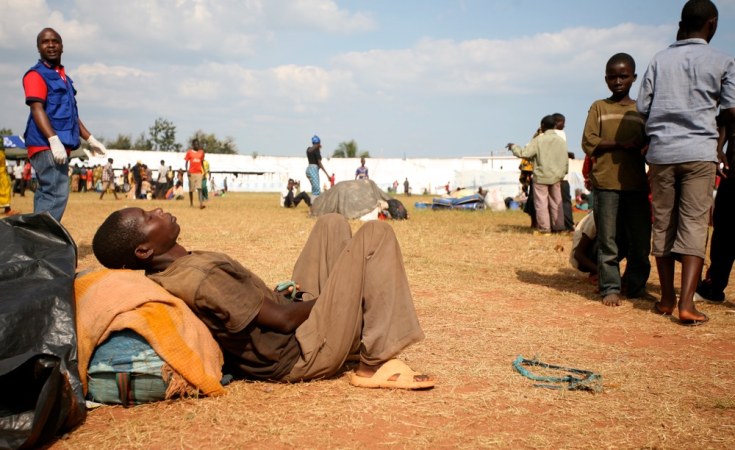As Angola sends troops, Congo hopes that new military alliances can stop the violence in its eastern regions. Massacres are increasing, humanitarian aid is paralyzed and a new mass exodus seems inevitable.
The effects of violence and instability are spilling over the Democratic Republic of Congo's borders. Since the beginning of March, 300 to 600 new Congolese refugees have been arriving in neighboring Tanzania daily, according to authorities.
Tanzania's Migration Commissioner Sudi Mwakibasi told DW the refugees are being accommodated at the Nyarugusu Camp in the western province of Kigomo.
"We are fulfilling our responsibilities to protect refugees," Mwakibasi said.
Residents of eastern Congo's North Kivu province, like Selemani Malembe, who fled to Kigoma on the shores of Lake Tanganyika, fear attacks from a variety of rebel groups.
"We ask the government to help us. Many families have been killed," he said. Malembe's voice broke as he added that he did not know where his wife and children were.
The M23 rebel group began a new offensive towards North Kivu last year. Negotiations for a long-lasting ceasefire have so far failed.
More massacres and uncertainty
Recently, another threat has emerged. Around the town of Beni, northwest of Virunga National Park, fighters Allied Democratic Forces, a militia with links to the so-called "Ïslamic State" group have been accused of carrying out massacres, with dozens of victims shot or killed with machetes.
The Congolese and Ugandan armies have been cooperating under "Operation Shujaa" since 2021. But it has done little to stem the violence. In fact, attacks have actually increased since the end of February, when an ADF leader was killed.
Adolphe Agenonga Chober of the University of Kisangani told DW it was regrettable that making peace is increasingly being left to the joint Congo-Uganda force.
"It does not even control the whole area where the ADF is active," the researcher told DW. The military situation has also become more difficult to assess since the Congolese army began recognizing citizen self-defense militias as auxiliary forces under the traditional collective term "Mai-Mai."
"Sometimes it's hard to say if the armed groups are ADF fighters or recognized Mai-Mai self-defense groups."
International troops but no peace
In the faraway capital Kinshasa, frustration is growing. Attempts have been made to form an alliance with troops from the East African Community (EAC) to stabilize the seemingly endless insecurity and temper the M23 threat.
But even that has not really succeeded. The Congolese government says that when the EAC established buffer zones to secure the cease-fire, Congolese troops were caught on the outside, while M23 rebels could continue to maraud freely.
Last Friday, Angola decided to send 500 troops to North Kivu. President Joao Lourenco had positioned himself as a peace-broker in the conflict, bringing about a cease-fire agreement that chas already collapsed.
"The main goal of this military unit is to secure areas currently occupied by M23," according to an Angolan government statement. The force is also to protect troops monitoring the ceasefire.
Decades of conflict and intervention
The Congolese government's trust in Angola comes from previous military assistance Luanda gave Kinshasa in the 1990s after the fall of dictator Mobuto Sese Seko. In 1998, Angolan troops protected the regime of then President Laurent Kabila from falling to rebels backed by Rwanda and Uganda.
The links are still alive, says Congolese parliamentarian Juvenal Munubo: "Kinshasa seems to have more trust in Angola and the Southern African Development Community (SADC) than the EAC because the SADC countries are not direct participants in the conflict."
Still, it is uncertain if bringing in Angolan troops is a solution.
"The fact that troops are being sent from a country, which to this day is trying to position itself as a mediator, complicates the crisis even more," Reagan Miviri of the Congolese research institute Ebuteli, told DW.
"It's not certain Angola can achieve more than the foreign armies already present in the Congo have, especially if they are not prepared to engage the M23 militarily."
Congo's humanitarian crisis deepens
Meanwhile, hardship is growing for the people of North Kivu, and the refugees fleeing the violence. Dottie Adam Coulibaly, deputy head of the International Committee of the Red Cross (ICRC) said there are of over 300 000 internally displaced people in Goma, and a further 60,000 in the northern town of Kanyabayonga.
The ICRC is currently trying to help reunite people with their loved ones, using telephone booths in the camps.
"The biggest challenge for us remains providing access to humanitarian aid," says Coulibaly. With the conflict growing across more areas, Coulibaly says it is essential for combatant to guarantee access for aid organizations, and respect humanitarian aid workers and civilians.
This article was originally written in German.
Adapted by Cai Nebe
Edited by Benita van Eyssen


